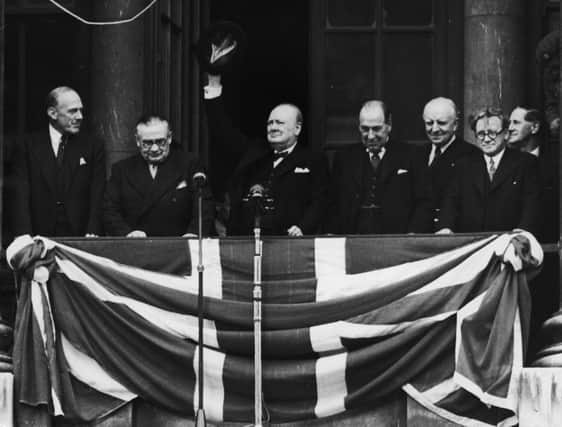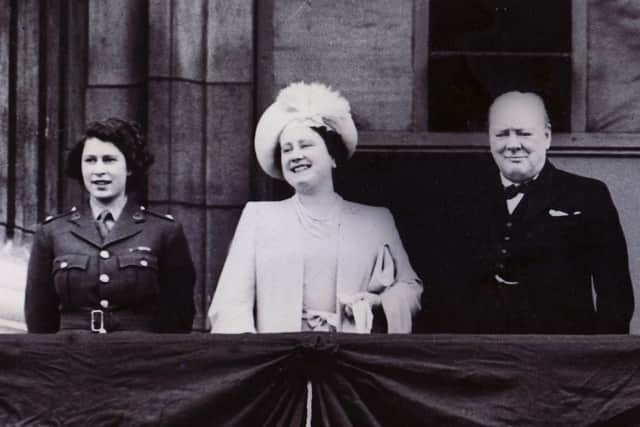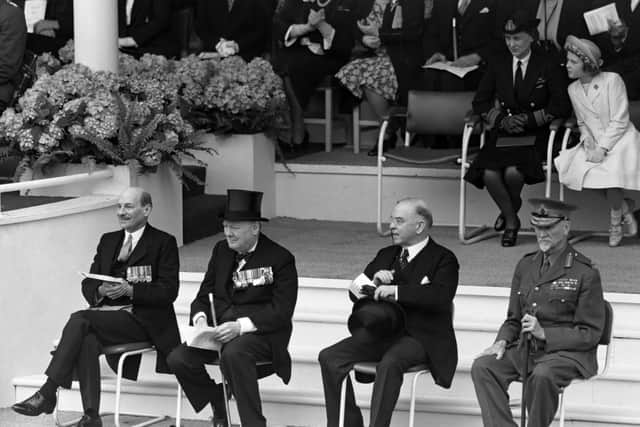What Winston Churchill and post-war politics teach us – Bernard Ingham


Hostilities had still three months to run before the nuclear age exploded on us with the defeat of Japan. But the die was cast before either celebration.
No offence was intended in Winston Churchill’s electoral defeat after his incomparable wartime leadership. The people were simply determined never to go back to the decay and, for too many, the hopelessness of the 1930s. Jarrow did not march in vain.
Advertisement
Hide AdAdvertisement
Hide AdClement Attlee, Churchill’s loyal deputy in war, was handed the task of building a welfare state out of national bankruptcy and made his mark on history. With the NHS came the end of the doctors’ bills my asthmatic, chesty family could not afford.


Even with increasing difficulty because of an ageing population, medical ingenuity, limited cash and suspect top-down management. This social welfare monument has served us well, as coronavirus has shown.
Of course, it has been abused. Its architect, Aneurin Bevan, soon complained about the “cascade of pills down the nation’s throat”. Too many health tourists see it as a cheap route to treatment. And, with supreme hypocrisy, too many Britons, egged on by ambulance-chasing lawyers, sue their sacred cow for “neglect”.
But the NHS remains a reminder of why Churchill was given the order of the boot in 1945. The working man – at his lathe or in his tank – truly sought a social democracy.
Advertisement
Hide AdAdvertisement
Hide AdChurchill’s magnanimity in electoral defeat as well as in military victory set another tone.


Notwithstanding where appeasement in the 1930s had got us, he and the officer-class of his party wanted a quiet life with the unions that dominated the Labour Party.
Here the result was tragic. Progressively, organised labour abused its power until the reckoning came in 1979. The UK became “The Sick Man of Europe” as strikes dragged the economy down to devaluation.
I have never felt poorer than in the 1970s when nearly 26,000 strikes, costing 128m working days, were recorded.
Advertisement
Hide AdAdvertisement
Hide AdThis is where appeasement got us as Ted Heath held his series of meetings with the TUC at Chequers, all of which I attended.
Blinded by power, the likes of Jack Jones and Hugh Scanlon were never going to see sense. It fell to Arthur Scargill, their natural but more militant heir, to meet the unions’ Waterloo. The movement has never recovered and never will with leaders like Len McCluskey.
Which brings me to Europe. I have the greatest respect for old soldiers like Willie Whitelaw, Lord Carrington, Francis Pym and Ted Heath in wishing never to fight another war – nor with the unions, either.
Like most of us, including Margaret Thatcher, they felt that we would be better in than out of Europe, though, I suspect, largely because of our abysmal industrial performance.
Advertisement
Hide AdAdvertisement
Hide AdThis was notwithstanding imperialist Churchill seeing Britain standing outside a United States of Europe and Labour leader, Hugh Gaitskell, warning us 10 years before our entry, that our membership would see “the end of a thousand years of history”.
Once again in 2016 the British people rejected the Establishment in demanding Brexit. In the post-coronavirus world, we shall face it alone as an independent, sovereign nation. Life, it seems, has come full circle in 47 years.
What should we learn from the watersheds of 1945, 1979 and 2016?
First, appeasement brings its own reward in strife and ultimately degradation. Belsen – the newsreel sights in 1945 still haunt me – Auschwitz, Dachau and Buchenwald are its ultimate condemnation.
Advertisement
Hide AdAdvertisement
Hide AdMrs Thatcher, irreparably affected by her pre-war friendship with Edith, a Jewish refugee from Austria, eventually saw Nazism (national socialism) and Communism (international socialism) as two sides of the same coin.
That did not stop her from seeking a better way of living with the Soviets but always from a position of strength. It ended the Cold War until Vladimir Putin and an aggressive China effectively reintroduced it with, among other things, a cyber war.
Second, you cannot maintain a position of strength without economic success. That has now to be rebuilt along with our social institutions, as in 1945, on a vast indebtedness. And if the current NHS proves anything, it is that centralised bureaucracy – the Big State – has its limitations.
Third: remember Churchill’s maxim: Trust the people. You can kid some of them some of the time but….
Advertisement
Hide AdAdvertisement
Hide AdCommon sense will always eventually prevail. Why keep it waiting?
Editor’s note: first and foremost - and rarely have I written down these words with more sincerity - I hope this finds you well.
Almost certainly you are here because you value the quality and the integrity of the journalism produced by The Yorkshire Post’s journalists - almost all of which live alongside you in Yorkshire, spending the wages they earn with Yorkshire businesses - who last year took this title to the industry watchdog’s Most Trusted Newspaper in Britain accolade.
And that is why I must make an urgent request of you: as advertising revenue declines, your support becomes evermore crucial to the maintenance of the journalistic standards expected of The Yorkshire Post. If you can, safely, please buy a paper or take up a subscription. We want to continue to make you proud of Yorkshire’s National Newspaper but we are going to need your help.
Advertisement
Hide AdAdvertisement
Hide AdPostal subscription copies can be ordered by calling 0330 4030066 or by emailing [email protected]. Vouchers, to be exchanged at retail sales outlets - our newsagents need you, too - can be subscribed to by contacting subscriptions on 0330 1235950 or by visiting www.localsubsplus.co.uk where you should select The Yorkshire Post from the list of titles available.
If you want to help right now, download our tablet app from the App / Play Stores. Every contribution you make helps to provide this county with the best regional journalism in the country.
Sincerely. Thank you.
James Mitchinson
Editor
Comment Guidelines
National World encourages reader discussion on our stories. User feedback, insights and back-and-forth exchanges add a rich layer of context to reporting. Please review our Community Guidelines before commenting.